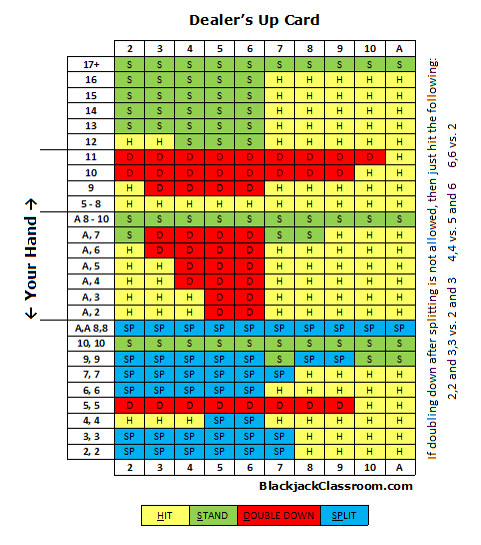Here's the situation:
You're playing in a multiple deck game, and receive a five and a three for a two-card total of eight while the dealer flips a six as his upcard. Standing with this hand is, of course, out of the question. Your decision comes down to whether you're going to hit the hand or double down. Which of these do you do?
Blackjack is the world’s most popular casino game. And is one of the top choices for online casino players looking to enjoy the game from the comfort of their own homes. One of the most important things you can learn about as a blackjack player is how the strategy affects the game, since it can literally make the difference between being a winning player and one that loses consistently. Blackjack in a 6 deck or 8 deck shoe in Vegas typically pays 3:2, but there is a recent and disturbing trend for the big casinos to have blackjack tables that only pay 6:5 on tables with a shoe. The casinos are targeting casual players that are not aware of this difference.
My best advice as to the correct play is not to double, but to hit the hand.
Look - having the eight is really not a strong enough hand to be doubling on. Remember that the average dealer hand comes out to a value of 18.23. So as far as a winning hand is concerned, you're holding something that is actually less than average.
Also remember that even with a six as his upcard, the dealer will only bust about 43% of the time. So your positive yield for doubling is minimal since you're only going to win 4% more than you lose.
On the other hand, when you hit the eight, you'll win nine more hands than you lose, per hundred. So your gain with simply hitting is slightly greater than if you executed a double-down.
Always keep in mind that opinions are not relevant in the game of blackjack. Mathematics matters. Probability takes precedence. Solid basic play is not predicated on the proposition that your 'hunch' is going to work this time around. We play the percentages. We don't flinch. We memorize the right way to go and we do it every time.
6 Deck Blackjack Strategy With Surrender
US vs. THEM Blackjack Strategy Series
An Analysis
By Charles Jay
Best Blackjack Bonuses
These bonuses allow you to play blackjack to clear the bonuses wagering requirements.
- Casino
- Bonus
- Rating
- Info
- Play Now
- Intertops Casino Classic
100% Up To £/$/€100
- 4.4/54.4/54.3/54.4/5
- Liberty Slots Casino
100% Up To $259
- 3.9/54.4/53.5/53.8/53.9/5
- Miami Club Casino
100% Up To $100
- 4.1/54.3/53.5/54.4/54.1/5
More on How to play Blackjack
Wizard Recommends
Blackjack 2 Deck Strategy
- €1500 Welcome Bonus
- €100 + 300 Free Spins
- 100% Welcome Bonus
Six Deck Blackjack
On This Page
Introduction
To use the basic strategy, look up your hand along the left vertical edge and the dealer's up card along the top. In both cases an A stands for ace. From top to bottom are the hard totals, soft totals, and splittable hands. There are two charts depending on whether the dealer hits or stands on soft 17.
Other basic strategy rules.

- Never take insurance or 'even money.'
- If there is no row for splitting (fives and tens), then look up your hand as a hard total (10 or 20).
- If you can't split because of a limit on re-splitting, then look up your hand as a hard total.
Ideally, the basic strategy shows the play which, on average, will result in the greatest win or the least loss per initial hand played. The way I usually go about this is to look at the initial 2-card hands only. Generally, this will result in the overall best play. However, soft 18 against a dealer ace when the dealer stands on soft 17 provides the only known exception that I am aware of for any number of decks. As my blackjack appendix 9 shows, a 2-card soft 18 vs A has an expected value of hitting of -0.100359, and of standing -0.100502. So with two cards it is very slightly better to hit. However, not all soft 18's are composed of two cards. The more the cards in the player's hand the more the odds favor standing. Simulations show that if forced to always hit or always stand, it is better to stand. I would like to thank Don Schlesinger for bringing this unusual play to my attention.